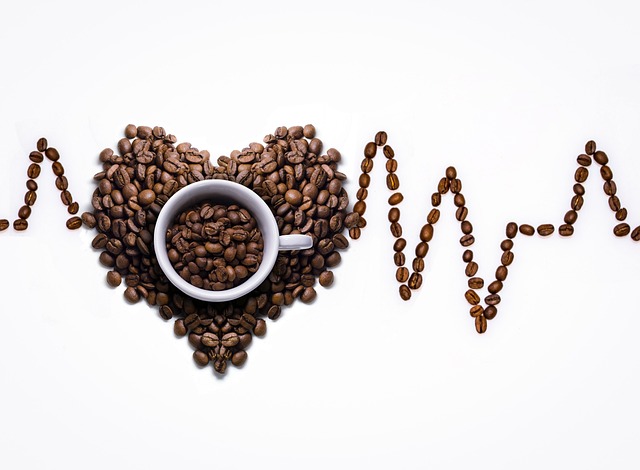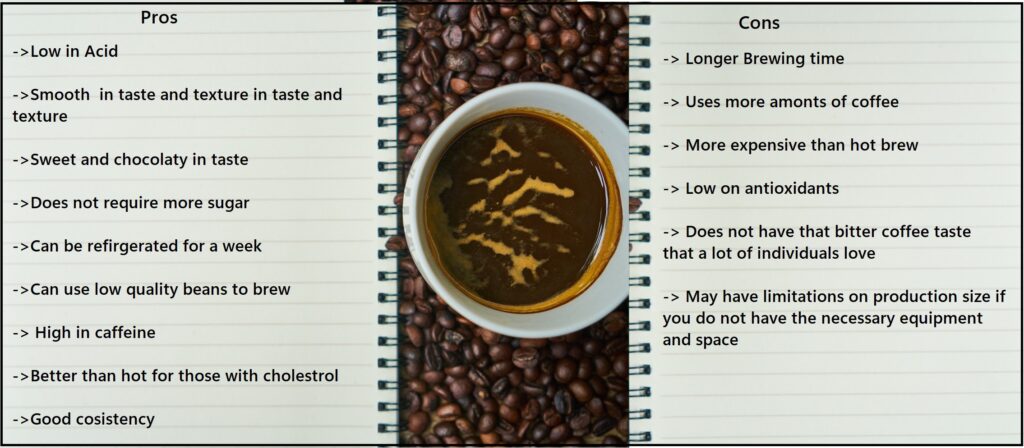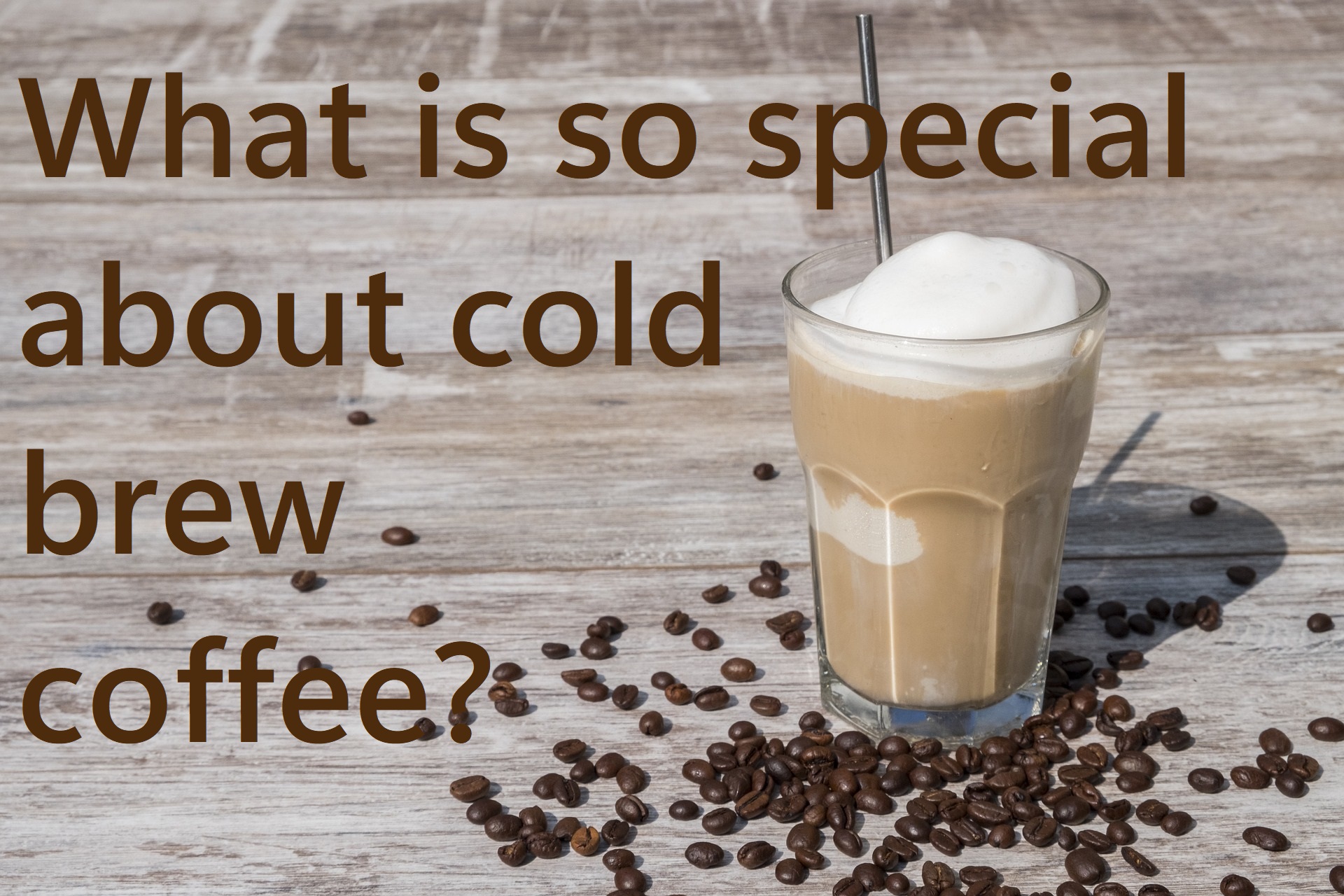Cold brew is gaining popularity and emerging as a new trend in the beverage industry, and rightly so. There are many features of cold brew that have lead to it’s increasing popularity.
When coffee is brewed using cold brew method, a lot of it’s characteristics and constituents are impacted. Water at different temperature would make the coffee beans react and diffuse differently. Some of these characteristics are the taste, texture and consistency. The taste of cold brew is quite different from that of hot brew. It is much sweeter and richer in taste. The kind of taste it leaves your palate with is also quite different from that of any coffee that has been brewed hot. Also, if you have the basic equipment, brewing with this method is very easy. It is certainly time consuming, but very easy.
Many individuals are still new to cold brew and want to know more. If you are one of those, we have got you covered. In this article, we have covered various topics surrounding this new preference of coffee drinkers. These include- what is cold brew coffee, its health benefits, how it is made, is it high on cholesterol, and a comprehensive summary of its pros and cons. Let’s get started!
What is cold brew coffee?
Coffee is called cold brew when it is brewed in room temperature or even cold water. As we know, normally, coffee is brewed in hot water. However, in cold brew process, coffee is made to sit in room temperature or cold water for extended hours. The time can be anywhere between 12 hours to 48 hours, or even longer. It can brew on the shelf at room temperature, or inside the refrigerator.
During the steeping process, the compounds and flavors of the coffee are slowly released into the water. Since the water is cold, the process happens at a slow pace. On the contrary, when we brew in hot water, the diffusion is accelerated. This way, beans are made to release the oils and other compounds at a faster rate. In the cold brew method, some of the substances, that need heat in order to diffused are absent. This way, cold brew does not have the same taste as hot coffee.
In fact, it would not be same as iced coffee as well. This brings us to our next question!

How is cold brew coffee different from iced coffee?
Since iced coffee was brewed in hot water, it will have the same compounds as in hot coffee. On the contrary, cold brew happens at room temperature. This way, flavors and oils in the beans are very slowly released. They also take their time to nicely diffuse and dissolve in water.
During brewing process:
When brewed in hot water, the diffusion process is accelerated. The flavors are extracted into the water faster and mixed mor easily. This coffee is made to cool to make iced coffee. Iced coffee will also have a slightly acidic taste.
Cold brew coffee will not have an acidic or sour taste as some of the sour components take longer to diffuse. They may only diffuse when the coffee is subject to hot temperature. Which never happens in cold brew. Thus, cold brewed coffee will be naturally sweeter than iced coffee.
After the coffee has been brewed:
Due to the intense heat involved in the process, the oxidation process is accelerated. Thus, the molecules present in the coffee are broken down at a much faster rate even after the coffee has been brewed. Therefore, hot brews must be consumed within 30 minutes for the best taste. Iced coffee will turn acidic if it is let to rest for about 3-4 hours. Although, it can be kept in the refrigerator for a day or two.
On the contrary, the oxidation is extremely slow in cold brews. Thus, they can taste the same for 5-8 hours after the drink has been prepared. It can be kept in a refrigerator for about a week.
Why is cold brew more expensive than regular coffee?
Almost every time, you need to shell out more money if you need go for cold brew over regular brew. Let us understand why that is:
- Cold brew uses more coffee: As already mentioned several times, it would require nearly double the amount of coffee. Therefore, increased cost of coffee used for your drink makes it more expensive.
- The taste: Coffee brewed with the cold brew technique has a much sweeter and smoother flavor. It also has a bolder taste of coffee with a hint of a chocolaty flavor. This is why a lot of people are willing to pay more for it. Hence, the higher price.
- Storage space: A lot of cafes do not have a large amount of space to separately store cold brew. Since added equipment to store the same comes at a cost, the cost of your coffee is higher.
- It takes more time: Brewing coffee with the cold brew process requires more time. Higher the time taken, the more expensive it gets.
- Limitations on production: Since you would need huge equipment and space to produce cold brew in bulk, it is brewed in limited quantities. You can only brew a limited amount based on the size of the container you have for steeping coffee. Thus, it is very difficult to produce it in bulk, making it more expensive.
- Higher demand: Owing to the smoother flavor and various health benefits, cold brew has a higher demand these days. Thus, buyers are willing to pay a premium for the same. Hence, cold brews are priced higher than hot brews at coffee shops.
Difference Between Cold Brew and Hot Brew
Let’s quickly look at the differences between cold and hot brew. This will help us gain a better understanding of cold brew and understand how it is different from hot brew.
| Cold Brew | Hot Brew |
|---|---|
| Smooth flavor | Acidic flavor |
| Naturally sweet | Less sweet |
| Less Bitter | Bitter in taste |
| Does not turn sour in taste if left out | Turns sour if left out for some hours |
| Requires double the amount of coffee | Uses lesser than cold brew |
| Leaves a smooth texture on the palate | Leaves a dry texture on the palate |
| Has higher caffeine | Has less caffeine |
| More expensive (More time taken to brew and uses more coffee) | Less expensive (Brews quickly and uses less coffee) |
| Has a good consistency | Tends to get watery if you are making iced coffee. Consistency for regular or milk coffee is good |

Is cold brew a waste of coffee?
If you are concerned about the number of coffee beans used to make cold brews, then cold brew is indeed a waste compared to hot brew. But there are other factors that can be considered to understand if your coffee is actually getting wasted. They are:
- Amount of coffee: Usually, a hot brew requires 55 gm of coffee beans mixed with 1000 gm of water to make a perfect, delightful cup of coffee. This normally increases to 80-100 gm of coffee beans per 1000 gm for cold brew coffee. Thus, we can conclude that cold brew coffee requires roughly around 1.5 times more ground beans than what is used to make the same quantity of hot brew coffee. Furthermore, depending upon how strong you like your coffee, you may want to increase the amount of coffee ground. I have noticed that I normally use about 1.8 times the coffee for my cold brew.
- Quality of coffee: You must not ignore the quality of beans permissible to make these coffees. While traditional coffees show a drastic change in taste and appearance if not made with fresh beans, cold brews show a forgiving nature. So the beans you can never use for brewing traditional coffee can easily enrich the taste of your cold brew coffee, thus preventing you from wasting all these unwanted coffee grounds.
- No wastage: You can also store cold brew coffee for a longer period than traditional coffee. So you won’t be worried about coffee going down the drains if you don’t drink it all at once.
THE MAKE AND COMPOSITION

How is cold brew coffee made?
Cold brew coffee is made by putting coffee ground in water. The water can be either cold or room temperature. It is then made to sit either on the shelf or in the refrigerator. Let’s learn how to make a cup of cold brew coffee at home step by step.
Ingredients and equipment required
- Coarsely grained coffee beans: You can either grind them at your home (if you have the grinder) or ask the seller to do it for you. Coarsely grained beans are also readily available in online stores. However, if you have a grinder, then you can grind the beans coarse at home. The beans should not be powder like. Rather, they should be rough and slightly big in size.
- Cold water or water at room temperature: You can use cold or room temperature water. Filtered water is always recommended for coffee because it enhances the taste.
- Storing container: Airtight jar is preferred if you want to store your coffee for a long period because it prevents oxygen from oxidizing or degrading your coffee.
- Strainer: Lastly, you need a strainer to separate the coffee grounds from the concentration. There are dedicated coffee strainers available in the market. But there’s no compulsion to buy it. You can use some readily available kitchen tools such as paper filters, cheesecloth, etc., for this purpose. Among all these, nut milk bags enjoy the most preference.
Procedure
- STEP 1- Take one part of coarsely-grained coffee beans in comparison to 5 parts of water. You can change the proportion based on how strong you want your coffee to be.
- STEP 2- Put the coffee beans into a jar. Pour water over it. Give this a good stir and then close the lid. Allow the coffee beans to steep for around 12-18 hours (depending on how strong you like it). During this process, the coffee is infused slowly into the water, creating a concentrated brew. Remember that this is a concentrate that needs to be diluted.
- STEP 3- Use a strainer to filter out the grounds from the brew. Then you can add milk, or ice to it depending on your taste. Sweeteners may also be added. If you want to drink it warm, you can warm it up. I normally add hot milk and 1 tsp sugar to it.
The best thing about this coffee is that you can store it in the refrigerator for 6-7 days. So if you are a person like me, needing coffee every day, you can just make it on weekends. This way, you will have your coffee supply for the entire week.
Is cold brew stronger than regular coffee?
It is debatable. While cold brew is normally considered to be stronger than hot brew or regular coffee, it actually depends on case to case basis. On the contrary, hot water helps extract caffeine faster from coffee, so hot brew should have more caffeine. This is because the caffeine content determines the strength of the coffee. However, as we have mentioned, more coffee beans are required in the cold brew process. The actual strength of the coffee would depend considerably upon the following factors:
- How much it is diluted: If you drink the concentrate without diluting it, the caffeine content will be very high. But if you dilute it with milk, water, ice, etc., you might be able to drink a cup of cold brew coffee of the same strength as hot coffee.
- The quality and freshness of beans used: The infusion would depend on the quality of beans used as well. While good quality will give you a stronger brew with a nicer aroma, inferior quality beans may not make your coffee as strong. Also, fresher the coffee, richer the aroma.
- The soaking time: Higher the soaking time, stronger the coffee would be as it would get more time for the infusion process. If you do not want your cold brew coffee to be very strong, you can only brew it for 6-8 hours. On the contrary, if you like your coffee strong, you can brew it for as long as 16 or even 24 hours.
- Amount of coffee: Clearly, higher the amount of coffee, the stronger your coffee is going to be.
- Water temperature: The temperature of the water also contributes to the strength of coffee. The hot water extracts more caffeine from the grounds than cold water.
- The grinding process: If coffee beans are very coarsely ground, coffee would take much longer to infuse, increasing the brewing time. Smaller ground size expediates the process. However, we know that we should not use fine powdered coffee for cold brews as it is tricky to filter it.
THE HEALTH ASPECTS

Is cold brew coffee healthier?
Yes, cold brew is considered healthier than regular coffee. How coffee is brewed determines not just the level of acidity, but other parameters as well. The mineral content and the presence of antioxidants also depend largely on how coffee is brewed. The following reasons contribute to cold brew being considered healthier than other brewing methods like drip technique, French press and espresso.
- Rich in anti oxidants: Coffee is believed to have thousands of antioxidants. The antioxidants increase when coffee is roasted. It is believed that cold brew helps preserve or retain these antioxidants. This is because, oxidation process is accelerated in hot brewing techniques. The chlorogenic, ferulic, caffeic, and n-coumaric acids in coffee determine it’s antioxidant activity. An interesting thing to note here is, melanoidins are synthesized in coffee during the roasting process. Maillard is also believed to be formed during roasting. Phenylalanines and heterocyclic compounds are also believed to show high antioxidant properties.
- Mineral Rich: When coffee is infused without being heated, it has been found to be more mineral rich. It has been found to contain magnesium, manganese, cobalt, chromium and potassium. These make it healthier than regular coffee.
- Lower acidity: Cold brew is less in acidity. cold brew coffee doesn’t need heat to be formed and is hence much lower in acid. This is why people often find cold brew easier to digest than hot brew coffee. This is also why it is preferred by people suffering from chronic heartburn or gastroesophageal reflux disease.
- More caffeine kick: As we know, caffeine increases metabolism in our bodies. The exact amount of caffeine may vary depending upon how much water or milk you use to dilute it, and the amount of coffee. Having said that, normally, cold brew is found to contain higher amounts of caffeine. Thus, it helps to make you feel active.
- Improved focus: Being high in caffeine, it helps to increase focus and attentiveness. You feel more energetic.
- Reduces risk of disease: It also keeps some serious diseases like Parkinson’s, Alzheimer’s, dementia, amnesia, etc. away. Now, since cold brew coffee has more caffeine content, it naturally works better in these areas.
- Lowers sugar intake: Since cold-brewed coffee is less acidic, they are less bitter, so you won’t need to empty your sugar cans into them to cover for this bitter taste, thus cutting down your sugar intake.
- Lower calories: Since cold brew is smoother, you would also add less amount of cream or milk to it. Consequently, the drink will have low calories than a regular hot brew topped with cream.
Is cold brew coffee bad for cholesterol?
While coffee is bad for cholesterol and has a significant impact on LDL cholesterol. However, cold brew is considered safer than hot brews owing to the following reasons:
- Oils present in your coffee: As we know that coffee beans have certain different types of oils present in them. The cholesterol increasing effect of coffee has been found to be associated with the oils contained in it. Among these, the two most important and worrisome are cafestol and kahweol. They suppress LDL clearance levels in our body, thus increasing cholesterol levels. Since hot brew coffee requires heat to be made, they increase the extraction of these oils. Cold brew coffee doesn’t involve heat, it gives the oils enough time to get extracted slowly. When you drink cold brew, it does not contain as many of the oils as hot brew would contain. Therefore, it would not negatively impact your cholesterol levels.
- Filtration of the coffee: If the coffee is not filtered properly, you will consume the coffee ground. This way, any un-absorbed oils, that did not make their way into your coffee during steeping, enter your body. These can now be absorbed by the body, resulting in increased cholesterol levels. However, paper filters can filter out these oils for you, making cold brew coffee even safer for you.
- Soaking time: Soaking time of your coffee determines the rater of extraction of the aforementioned oils. Lower the soaking time, safer is your coffee considered to be.
- The amount of coffee you drink: Regardless of the brewing technique, the amount of coffee impacts your cholesterol levels. If your coffee consumption is over 4 cups a day, then the chances of it negatively impacting your cholesterol are higher. Having 2-3 cups is considered safe.

Is cold brew coffee bad for diabetes?
No, cold brew is not bad for diabetes. While it may be a common perception that because of the sweeter and less bitter taste, cold brew is bad for diabetes, it is not true. The following reasons support that it is as good as, if not better, than regular coffee for diabetes.
- It has magnesium and chromium. Both of these help in controlling blood sugar levels as they support insulin usage.
- Polyphenols in coffee are believed to lower the risk of type 2 diabetes.
- Coffee makes people more active. So after having your cold brew coffee, or any coffee, you would feel more energetic. You would be able to work out better. Any type of workout, including brisk walking is considered good for diabetes.
- Since cold brew has a naturally sweeter taste, the need to add more sugar or syrups to it is less. Also, since it is not bitter, you can still enjoy a cold brew without any sugar. This also makes cold brew safer for diabetes.
How long does cold brew last in your system?
In this area, cold brew is no different than hot brew. It is absorbed in the system in 15-30 minutes of consuming the drink. In about 1 hour’s time, the coffee peaks in the system. The level stays high for about next couple of hours and starts reducing eventually. In 6 hours time, the caffeine in your system reduces to half. It further reduces over time. After 10 hours, there is very little to no caffeine in your system. However, it can even take about 24 hours for the caffeine to totally exit your system. How much time it actually takes depends on a lot of factors. Some of them are:
- How much water you have: The overall time caffeine stays in your system is also governed by the amount of water you drink. It helps flush out caffeine from your system. So the more water you drink, more quickly the caffeine will flush out from your system.
- Any medication you take: If you are taking any medication, that has caffeine, then, there may still be caffeine in your system. Even well after the caffeine from your cold brew had left the system. Other drugs can also impact your metabolism, impacting the time the caffeine lasts in your system.
- How much caffeine you had: Stronger the coffee, longer it will last in your body. Also, even when it is halved after 4-5 hours, there can still be too much caffeine in your system. e.g., if your drink had about 200 mg of caffeine, in about 4 hours, there would still be 100 mg in your system. On the contrary, if your coffee is not very strong, your system may be completely clear off it in about 8-10 hours.
- Other liquids: Lemonades, fruit juices and clear soups help lower caffeine levels in your system. Like water, these liquids help flush out other toxins as well.
- If you have had food: Food lowers the jittery impact of caffeine on your system.
- Workout: Yes, exercising can help you lower the levels of caffeine in your blood. It can aid burn off the extra energy you gain by consuming caffeine.
- Your metabolism: Each person has a unique metabolism. How fast they are able to complete get rid of the coffee from their system can be unique to them.
What are the pros and cons of cold brew coffee?
Now, since we know the basics of cold brew coffee, let’s put the pros and cons together.

Pros
- Low on acid: Since it is lower in acid, it is easier to digest and more acceptable for people suffering from chronic heartburn.
- Smooth in taste: It leaves a smooth taste on the palate rather than leaving your palate feel dry and bitter.
- Chocolaty: A lot of people feel cold brew is rather more chocolaty and sweet when compared to hot brew. For those who do not like the bitterness of hot brew, cold brew feels like a blessing.
- Less sugar: Since it is naturally sweet, you would need to add lesser sugar than normal in your cold brew. Thus, making it healthier than hot brew.
- Longer shelf life: cold brew concentrate can be refrigerated for 6-7 days comfortably. It does not turn bitter or go bad when refrigerated, unlike hot brew.
- Can use low quality beans: Even if you use low quality or slightly old coffee grounds, you would notice that there is not much difference in the taste. While fresher coffee grounds do feel better, older ones can still be used for cold brews.
- Higher caffeine content: The caffeine content is normally higher in cold brew, thus it lifts you up instantly.
- Better than those with cholesterol: It is better than hot brew for individuals with high cholesterol levels because of the aforementioned reasons.
- Has a good consistency: Since you do not need to add ice to it to instantly cool it down, it is less watery than cold coffee prepared using hot brew.
Cons
- Longer time: Takes longer time to brew
- More coffee: Requires larger amount of coffee beans.
- Cost: It is more expensive at the coffee shops. Brewing it at home also turns out to be more expensive than hot brew as it uses a lot of coffee beans.
- Low on antioxidants: It is lower in antioxidants responsible for some of the coffee’s health benefits. this is because some antioxidants are synthesized and extracted when coffee is brewed hot.
- Requires more space: If you do not have the right equipment, or storage space, cold brewing process may become intimidating for you. This applies especially if you need to brew large batches for friends and family.
- Lacks bitterness: It does not have the bitter taste of coffee. A lot of people love coffee for the slight bitterness it has. But cold brew does not have that to offer.
Conclusion
For those who love their coffee to be sweet, cold brew can be a great alternative to the bitter hot brew. It is also amazing for those who just love the fact that it can be left in cold water in the refrigerator. All you need to do on a lazy morning is, dilute it by adding more water, or milk, or syrup based on your preference and enjoy your coffee. We must also appreciate the fact that different people react to caffeine differently. So you can decide for yourself based on your experience.




